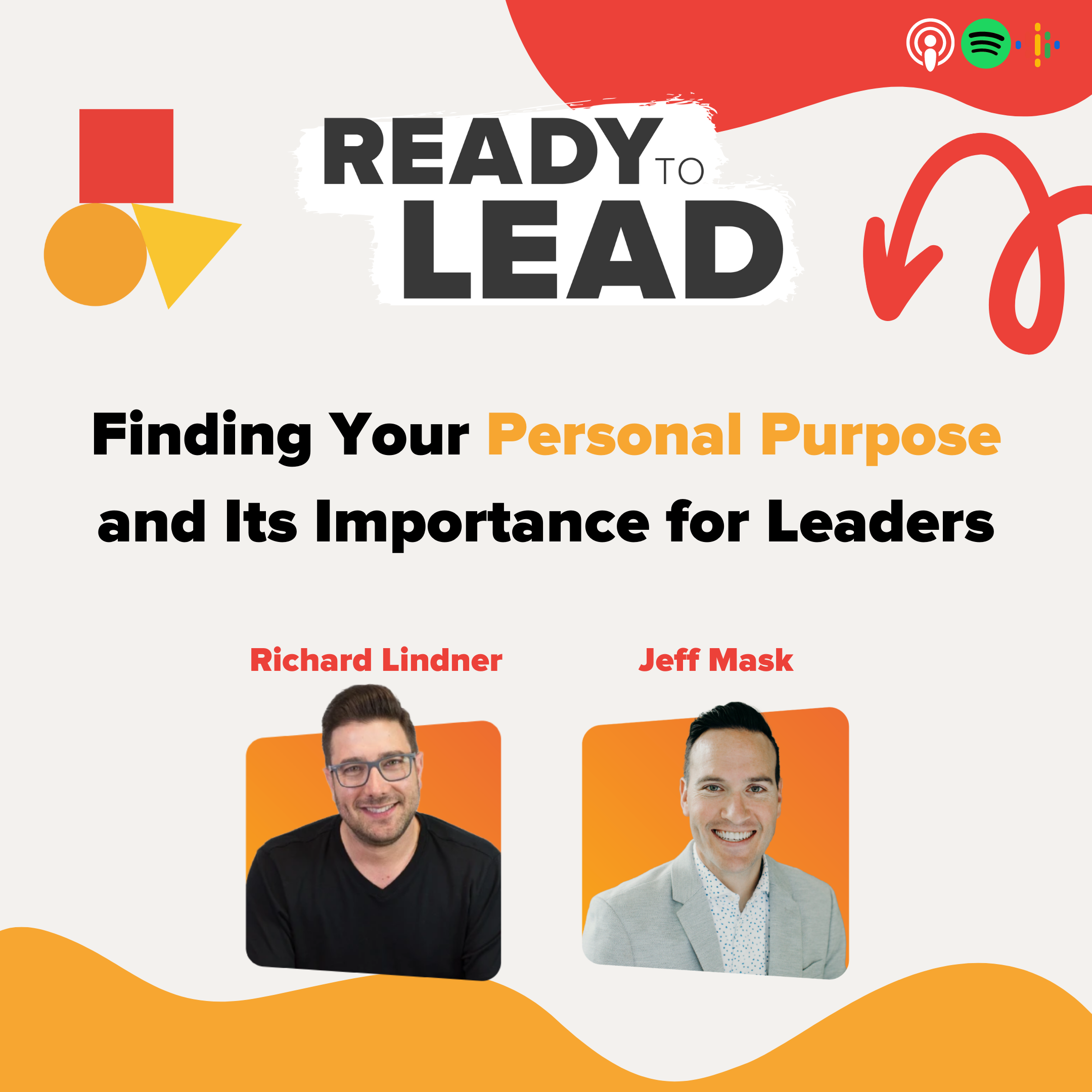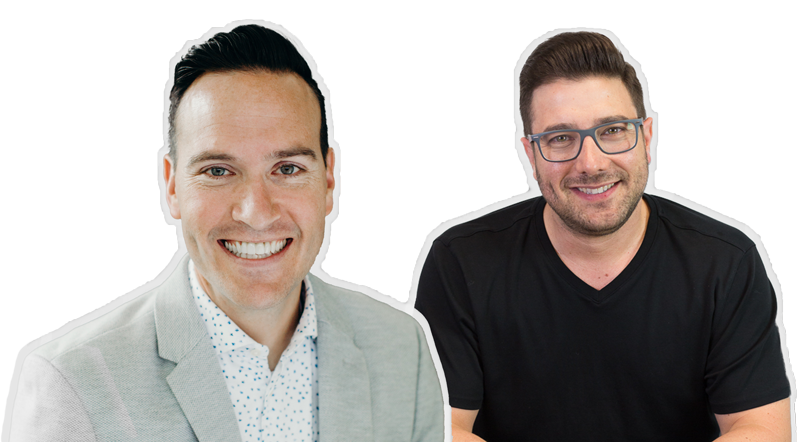When you know your purpose, your why, as a leader, you’re able to set harmonious and powerful goals for yourself and your team.
In a previous episode, co-hosts Richard Lindner and Jeff Mask talked about setting relevant goals that align with their overarching purpose as a company. In today’s episode, they want to continue that conversation and connect some dots. How do you go deeper into your own personal why, your personal purpose? This is a topic that is absolutely invigorating for Jeff and, frankly, pretty intimidating for Richard.
As they chat, Jeff plays the teacher/coach/guru/spiritual guide and Richard is the critic/cynic. Listen in for two very different and valuable perspectives on discovering your life’s purpose.
Richard’s Reluctant Perspective
What if you don’t know what your personal why is? What if you’re not even sure you care to know? Then you’re on Team Richard. Richard says, “I don’t clearly know my personal why. I don’t have a personal mission statement. I can’t tell you my personal purpose.”
What Richard does know is that, at the Scalable Company, their purpose is to help entrepreneurs scale themselves so they can scale their companies. It’s something he’s really passionate about. He’s also passionate about the Ready to Lead podcast because he believes he and Jeff can help other leaders learn from their failures and mistakes.
Richard is envious of those who have personal mission statements. It’s hard for him. Blue ocean thinking and dialing that in are not his strengths. He just wants to get to work on his goals. But, because of his deep respect and admiration for Jeff, he’s willing to listen and is open to changing his mind.
Jeff’s Passionate Perspective
Jeff believes this episode will be so valuable to people on both sides of the issue. Those who don’t know their purpose and those who do. He’s going to share a few exercises and frameworks he uses to help the CEOs and leaders he coaches uncover their why, the gift they bring to the world.
“The clearer we are on our why,” he says, “and the more effectively we can set goals that are relevant and in harmony with our why, the more we’ll be in the flow, excited and energized.” So many people are already exhausted and burnt out, and the year has barely begun. He believes it’s because we’re not anchoring to our bigger purpose and the reason we exist. We’re missing out on a deeper, richer meaning we could attach to our goals that could fuel us and keep us going.
Jeff and Richard are both leading people in all walks of life. It’s important to understand people’s mindsets and backgrounds to lead them from where they’re at. Maybe you know your true why, but you’re leading people who don’t. Or maybe you don’t know yours, but you’re leading people who do. It’s important that we understand each other.
Some Necessary Prep Work in 3 Steps
Jeff has a valuable framework to share that includes four questions to ask yourself when trying to figure out your purpose. But, like most things, we need to do a little prep work first. We need to set a foundation for discovering our purpose and living into it. Here are 3 important first steps:
Step #1: Avoid perfectionism.
What happens very often when people try to discover why they exist is that they get stuck on making sure it’s perfect and exactly right before they go anywhere else. You kind of have to try it out. I think it’s this, or it might be this. Be okay to flex with it, tweak it, change it. If you’re a perfectionist, it’s all or nothing—and most often, it’s nothing.
Step #2: Ask yourself how at peace you are with your past.
Can you look in the mirror and embrace who is, rather than wishing you were someone else? Jeff says we adults are just kids in big people’s bodies, trying to figure out life, mask insecurities, things that have been buried deep since childhood. Either we embrace childhood insecurities and let them become strengths, or we make peace with them, or we let them go, or we’re tethered with childhood baggage. If we can’t make peace with our past, and we can’t embrace who we are in our present, it’s really hard to have clarity for the future and why we exist.
Step #3: We need a really healthy relationship with fear.
At our core as human beings, we are wired by fear. It’s how we survived from the beginning of humanity. Saber-toothed tigers wanted to kill us, and fear helped us survive. It’s still in our DNA. How we work it out in a modern civilization, when the tigers are no longer after us, is fascinating. Jeff says 95% of the actions we take are subconscious. We coast along in life on autopilot through learned patterns and behaviors. The more we can unpack why we do what we do, the more we get clear that it’s rooted in fear and avoidance.
Everything boils down to a fear of failure or a fear of loss. The journey to understanding that is advantageous to every human being. When our decisions are motivated by fear, we can hack our brains and choose a different path. A good book to help with this is Choosing Clarity: The Path to Fearlessness by Kimberly Giles. If we don’t make peace with it, it’s tough. We’re afraid of failing and losing something. Instead of pain avoidance, what if we lean into it? Articulating our fears out loud makes them way less scary.
4 Questions to Help You Discover Your Personal Purpose
Question #1: What does the world need?
Jeff likes to reframe this one as: What does God/higher power/the universe want for me? This one isn’t something you can answer in a second. Ponder, meditate, pray, listen to what thoughts come to your mind and write them down.
Richard pushes back on this one and says he’s not a self-promoter. His instant gut feeling is that this question is a little grandiose. “I just don’t have that big of an opinion of myself,” he says. He admits that it could be a limiting belief, but he knows he’s not alone in feeling this way.
Jeff says that fear and ego are cousins. It’s easy to look at ego and think, “That person is such a self-promoter. I’m not that. Who am I to say that I can make an impact on the world?” But he encourages us to ask, “Who am I NOT to show up and ask the universe what part I can be playing in the world?” The point is, it’s beyond us. What if each person on the planet asked, “How can I bless the lives of other people?” Think of what could happen.
Question #2: What do I love doing?
What gives me tons of energy? What lights me up? What makes me feel full? What kind of work would I be doing, so that when Sunday night comes, I can’t wait for Monday morning? When we know we’re on to something, we’re lit up, so on fire, so inspired, so grateful, so happy. It’s our oxygen that then enables us to provide oxygen to others.
Question #3: What am I good at?
Here’s how you know what you’re really good at. Typically, people will tell you that you’re good at something, but you brush it off. It comes so naturally to you that you don’t think it’s worthy of being applauded. You think, doesn’t everyone do this? There’s such a lack of effort required for you to do it that it doesn’t seem like it could be amazing.
Jeff says that, every time he hears Richard talk about setting up a system, learning a new technology, or making an operation efficient, he knows that’s his zone of genius. He’s so good at it, so wired for it, that he doesn’t understand why it wouldn’t come naturally to everyone. It doesn’t come naturally to Jeff, so Jeff can see the genius; Richard can’t.
Question #4: What can bring in income?
Where can I make money doing what I love and what I’m good at? This is the final piece.
The model is typically done with overlapping circles, and where they all come together is the epicenter of your purpose. What does the world need? What do you love doing? What are you good at? What are you paid for? When you put all of them together, that’s purpose.
When you combine what the world needs and what you love doing, that’s your mission. When you combine what you love doing and you’re paid for it, that’s a vocation. When you combine what you’re good at and what you’re paid for, that’s a profession. When you combine what you’re good at and what the world needs, that’s your passion. If you can find something in the middle of all of those, you’ve found your purpose.
By the end of the episode, Richard says he feels like he’s more of a believer now. Purpose doesn’t feel as overwhelming as he originally thought. Jeff says that, when we get clear on our personal purpose, we can set goals that align with our why. That’s where sustainability and longevity come from.
More than anything, Richard and Jeff want to awaken you, inspire you to live your fullest, best, most productive, happiest life. So many human beings don’t do this. Let go of fear, they say. Fear is what is keeping us from doing awesome, amazing, creative, big things in service of others. Let it go. And you’ll be ready to lead.
Richard and Jeff want to hear from YOU. Did something in today’s episode resonate with you? Do you relate more to Richard or Jeff when it comes to knowing your purpose? How can you take action today? They’d love to hear your feedback on this episode. Email them here with your thoughts/questions: feedback@readytolead.com
LINKS AND RESOURCES
- Choosing Clarity: The Path to Fearlessness (book by Kimberly Giles)
OTHER SHOWS YOU MIGHT ENJOY:
- Business Lunch with Roland Frasier and Ryan Deiss
- Perpetual Traffic with Ralph Burns and Kasim Aslam
- DigitalMarketer Podcast with Mark de Grasse and Mandy McEwen


